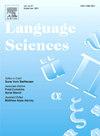The use of please in the expression of (im)politeness in the language of London teenagers and adults
IF 1.1
2区 文学
Q2 EDUCATION & EDUCATIONAL RESEARCH
引用次数: 0
Abstract
This paper explores the expression of (im)politeness in the language of teenagers and adults, looking specifically at cases of so-called ‘pragmatic reversal’ (Mazzon, 2017; Fedriani, 2019), in which a politeness marker is used with a confrontational meaning to threaten face. We focus on the use of please, traditionally a courtesy marker, in contexts where it expresses either positive or negative (im)politeness (Culpeper, 2011; Leech, 2014; Aijmer, 2015; Taylor, 2016), drawing on data from the London English Corpus and the spoken component of the British National Corpus 2014. Our analysis of teen talk suggests that please is sometimes used by adolescent speakers when there is a clear mismatch between polite and impolite formulae (e.g., ‘What's that shitty thing please?’). Such processes of pragmatic reversal seem to contribute to harmonious relationships among teenagers, consolidating mutual bonds, which is of key importance during the teen years, in that the discourse of these young speakers is governed by socio-pragmatic norms which differ markedly from those of adults. The paper concludes by noting the significant role of speaker age in the study of (im)politeness, and hence the need to address this issue both in terms of definitions of (im)politeness theory and in the application of these to real data.
在伦敦青少年和成人的语言中,用“请”来表示(不)礼貌
本文探讨了(im)礼貌在青少年和成人语言中的表达,特别关注所谓的“语用逆转”(Mazzon, 2017;Fedriani, 2019),其中礼貌标记带有对抗性的意义来威胁脸。我们关注的是“请”这个传统上的礼貌标记在表达积极或消极礼貌的语境中的使用(Culpeper, 2011;水蛭,2014;Aijmer, 2015;Taylor, 2016),利用伦敦英语语料库和2014年英国国家语料库的口语部分的数据。我们对青少年谈话的分析表明,当礼貌和不礼貌的表达方式明显不匹配时,青少年说话者有时会使用“please”(例如,“请问那是什么东西?”)。这种语用逆转过程似乎有助于青少年之间的和谐关系,巩固相互联系,这在青少年时期是至关重要的,因为这些年轻说话者的话语受到与成年人明显不同的社会语用规范的支配。本文最后指出说话人年龄在礼貌研究中的重要作用,因此需要从礼貌理论的定义和这些理论在实际数据中的应用两方面来解决这个问题。
本文章由计算机程序翻译,如有差异,请以英文原文为准。
求助全文
约1分钟内获得全文
求助全文
来源期刊

Language Sciences
Multiple-
CiteScore
2.90
自引率
0.00%
发文量
38
期刊介绍:
Language Sciences is a forum for debate, conducted so as to be of interest to the widest possible audience, on conceptual and theoretical issues in the various branches of general linguistics. The journal is also concerned with bringing to linguists attention current thinking about language within disciplines other than linguistics itself; relevant contributions from anthropologists, philosophers, psychologists and sociologists, among others, will be warmly received. In addition, the Editor is particularly keen to encourage the submission of essays on topics in the history and philosophy of language studies, and review articles discussing the import of significant recent works on language and linguistics.
 求助内容:
求助内容: 应助结果提醒方式:
应助结果提醒方式:


